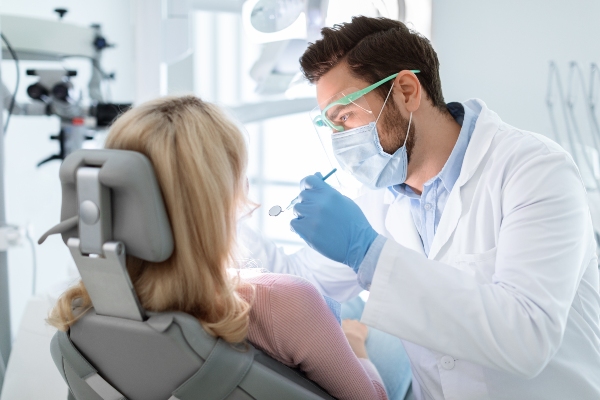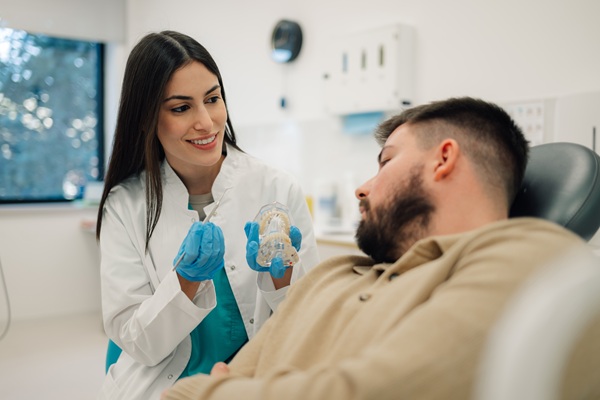 Most healthy dental patients are recommended to visit the dentist for routine dental care, which can include undergoing a cleaning twice a year and obtaining periodic X-rays to ensure the absence of cavities, gum disease, and other common dental abnormalities. Speaking with a dentist and keeping track of hygiene routines at home are great ways to ensure a lifetime of good oral health.
Most healthy dental patients are recommended to visit the dentist for routine dental care, which can include undergoing a cleaning twice a year and obtaining periodic X-rays to ensure the absence of cavities, gum disease, and other common dental abnormalities. Speaking with a dentist and keeping track of hygiene routines at home are great ways to ensure a lifetime of good oral health.
Why should patients ask questions at each dental visit?
Though a patient may assume the dentist will discuss whatever the patient needs to know at a routine dental care visit, it is always a good idea to inquire about oral health to stay actively involved in the maintenance of oral hygiene. Asking questions is even more important for patients who have preexisting medical conditions that affect dental health or those who have a history of dental issues, such as frequent cavities.
What questions can patients ask to ensure great dental care?
A dentist is able to advise a patient on several matters pertaining to oral health — not just brushing and flossing. Ask a dentist at the next appointment how to better maintain good health between visits.
1. How can I improve my oral health?
If the dentist notices that the patient’s oral health has declined, this may be an opportunity to inquire about their diet, oral hygiene routines, and any medical conditions that the patient has. Diabetes, in particular, can wreak havoc on the mouth due to constant high blood sugar levels, and the dentist can explain any dietary changes to consider so the patient may regain oral health.
2. Am I using the right kind of toothbrush?
A healthy patient may assume that there are no dental concerns to be discussed, but even people who have never had a cavity may have a significant buildup of plaque. Patients who have trouble brushing the molars in the very back of the mouth, for example, may need to consider using a different kind of toothbrush. A dentist can make a recommendation for a different type of toothbrush with a smaller or more flexible head.
If the patient finds flossing to be cumbersome, the dentist can have a conversation about how to make this activity easier. For example, if the patient has trouble remembering to incorporate flossing into the dental routine, simply posting a note in the bathroom may help.
3. How often should I visit the dentist?
Most dental patients can keep teeth and gums healthy by sticking to twice-yearly routine dental care. However, patients with medical conditions that can affect oral hygiene, such as diabetes or Sjorgen’s syndrome, may want to consider scheduling an extra checkup during the year to assess the state of oral health. This can also make sure that medical treatment for the condition is alleviating any dental discomfort.
Conclusion
Maintaining a great oral hygiene routine can keep teeth and gums healthy for a patient’s lifetime. Remember to ask a dentist if you have any questions regarding oral hygiene, visit frequency, or other conditions that may be affecting oral health.
Request an appointment or call Johns Creek Dentistry at 770-623-1427 for an appointment in our Johns Creek office.
Recent Posts
A crucial component of being healthy is routine dental care. When oral health is ignored, harmful bacteria can compromise the rest of the body. Healthy dental practices involve a two-prong approach of visiting the dentist regularly and continuing oral health care at home. Discover more about what is considered routine and effective dental care practices.Making…
Most people understand the importance of regular medical screenings to prevent various illnesses, but many do not realize the relationship between oral health and general health. Routine dental care is an essential preventative measure necessary to ensure good health.Gingivitis and periodontal disease can cause infections that lead to tooth loss, jawbone loss, bite changes, and…
Prioritizing routine dental care is necessary for good health. Unfortunately, some people can find it difficult to care properly for their teeth by brushing, flossing, and seeing a dentist on a regular basis. Patients who disregard dental hygiene and professional care need immediate action to prevent dangerous outcomes.In addition to an unsightly smile, failing to…


